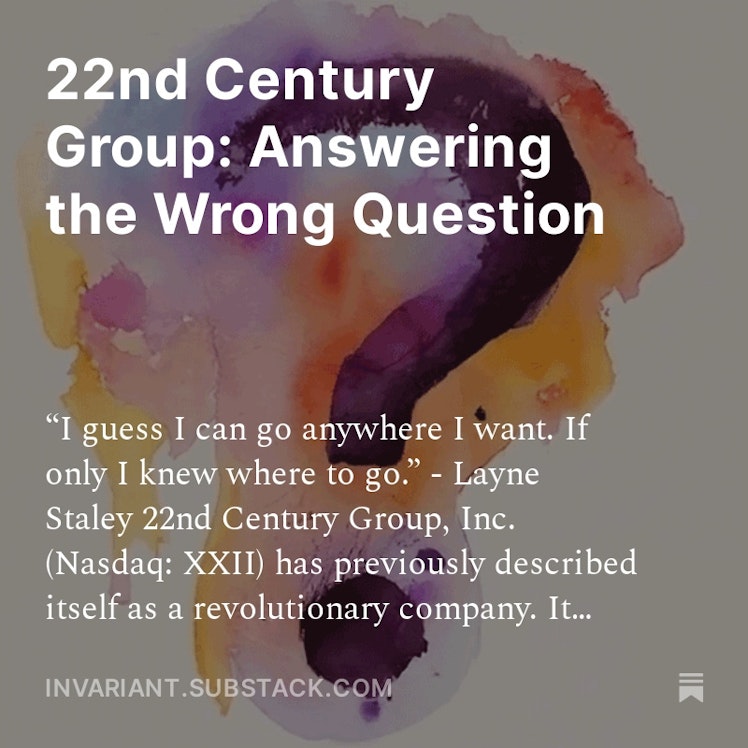Trending Assets
Top investors this month
Trending Assets
Top investors this month
$XXII 22nd Century Group: Answering the Wrong Question

“I guess I can go anywhere I want. If only I knew where to go.” - Layne Staley
22nd Century Group, Inc. (Nasdaq: XXII) has previously described itself as a revolutionary company. It was founded in 1998, became publicly traded in 2011, and, at times, has been the primary focus of various groups of excited investors. Too excited. Over the last decade, the company has experienced several meteoric rises in its stock price, largely a function of exuberant storytelling rather than sound fundamentals. Several bouts of excitement have been related to the company’s interests within the cannabis space—a haven for fanciful narratives. But a more recent driving force has been the company’s patented intellectual property related to the cultivation of specialized tobacco, granting it the ability to produce very low nicotine (VLN) cigarettes, with nicotine contents ~95% lower than traditional brands.
In December of 2021, 22nd Century Group received authorization for its novel products through the FDA’s Modified Risk Tobacco Product (MRTP) application process. The MRTP process is far more burdensome than the PMTA process, which is already woefully difficult for novel products to pass through unscathed. Only a few products have successfully gone through the MRTP process, and 22nd Century Group’s authorizations mark the first and only cigarettes to receive such a designation, providing the company with the privilege (and requirement) to display an exact message on the packaging of its cigarettes:
"HELPS YOU SMOKE LESS"
With MRTP designation, the prevailing narrative was that 22nd Century Group was optimally positioned to benefit from future regulatory changes to be pushed forth by the FDA. For years, the administration has slowly worked towards a product standard that would drastically reduce the maximum allowable level of nicotine within cigarettes. It was theorized that if such a standard were enacted, sales of XXII’s cigarettes would balloon, and other companies in the space would have to either buy tobacco directly from XXII or license its intellectual property—an immense windfall for the company. It was further argued that regulatory change barring menthol as a characterizing flavor in cigarettes would be an additional benefit to the company. XXII painted a theoretical scenario in which it receives an exemption for its VLN menthol cigarette, priming it to take over the entire submarket.
The straightforward benefit of VLN cigarettes is that, with a substantially lower level of nicotine, users would smoke less and thus be harmed less. That’s the theory, at least. At the bottom of slide five of XXII’s Q2’23 presentation, there is a quote that reads:
"VLN allows consumers to literally stare smoke in the face and say, “I don’t need you.”"
But if consumers can say “I don’t need you” to smoke, and VLN is a smokeable product, wouldn’t that suggest that consumers don’t need VLN? This hints at where the true problems are.
22nd Century Group has been...
Read the full piece at the link below:
invariant.substack.com
22nd Century Group: Answering the Wrong Question
The perilous journey of a once-favored story stock.
Already have an account?